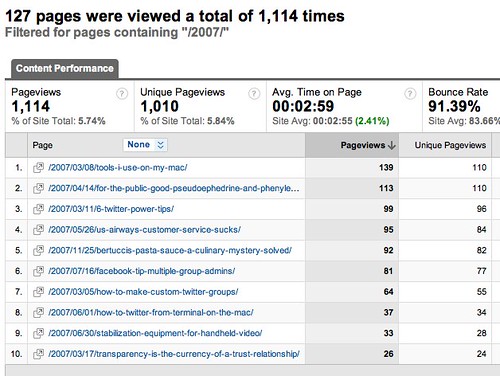How many of you knew me in 2008? In 2007? Far fewer of you than today, I’m sure. There’s a lot of good stuff on this blog – and on your blog – that you’ve undoubtedly missed if you’re a relatively new friend. Let’s talk today about how to intelligently do re-runs of your blog or other content.
First, you have to have an idea of what to re-run. Fire up your statistics package of choice. I’ll be using Google Analytics. Now, go to Content > Top Content. In the filter, type in the earliest year that you’ve got content for – in my example below, I typed in /2007/. Now look at the top content data you see. You’re looking at content for that year that search engines and visitors to your site still consider relevant today.
This is very important. Don’t use the data from way back then as a starting point because what was important and hot then may not be now. Use today’s data set (last 30 days) but filter on your post dates. I should add that if your URL structure doesn’t include the date in it, I have no idea how you’d do this. You’d have to know which of your older stuff was still popular.
Take a look at the list. Which stuff is evergreen, which stuff is still popular long after other content has gone to content heaven, in terms of audience interest?
Find a couple of these pages and pop them open in your editor. Re-read them, re-edit them, spruce them up, make any relevant updates to them, add links to your newer content that might have reference the older content, and then make a new summary post on your blog about the older pages you’re going back to.
Now, you may be saying, why shouldn’t I just copy and paste into a new blog post, so that it appears as brand-new content on my site? Those of you who mentally replied, “because older pages have valuable inbound links you want to keep”, pat yourselves on the back. Go back and spruce up, but leave the old URLs alone so that any existing links don’t break. You’ll also revive older comments and discussions if you leave the existing post alone and just shine a spotlight on it.
Remember this above all else when it comes to old content: it’s old to you, and probably you alone. In the ever-increasingly hypernetworked world we live in where new friends find us all the time, what you think is old content (assuming it’s not time-sensitive, like news, obviously) is brand new and fresh to them. Help them find your best stuff, no matter when it was written.
Here’s my old stuff highlight for now: How to build a video or camera stabilization rig for about $7. Still good after all these years, and for the very few of you who have been reading me for that long, did you remember this post existed, or was it just as much a refresher for you as it is new content to the newer friends reading it for the first time?
Good luck in dusting your old stuff off, and I look forward to reading what I’ve missed.
Did you enjoy this blog post? If so, please subscribe right now!
Get this and other great articles from the source at www.ChristopherSPenn.com! Want to take your conference or event to the next level? Book me to speak and get the same quality information on stage as you do on this blog.




Leave a Reply